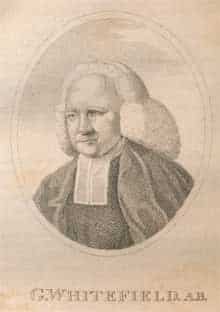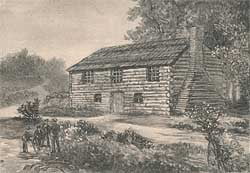One More Presbyterian Minister Stands for Liberty
by David T. Myers.
“Men of America,” the Presbyterian minister in Massachusetts preached, “citizens of this great country hanging upon the precipice of war, loyalty to England lies behind you, broken by the acts of the mother country – a cruel mother, deaf to the voice of liberty and right; duty to freedom, duty to your country, duty to God is before you; your patriotism is brought to the test; I call upon those ready to volunteer for the defense of the provinces against British tyranny to step into the ‘broad aisle.’” Those who did step into that church aisle became the first volunteers to join the Continental Army and fight in the Battle of Bunker Hill. A political liberty became his emphasis in those days.
Such rhetoric was more commonly found among Presbyterian pastors than any other denomination in the days and years of the American Revolution. It was no wonder that the Revolutionary War was characterized in England as the Presbyterian Rebellion. And one of those Presbyterian ministers leading the charge was Jonathan Parsons.
Born November 30, 1705, he was the youngest son of church deacon Ebenezer Parsons and his wife Margaret Marshfield of Springfield, Massachusetts. This line of Parsons could be traced back hundreds of years in England and later, equally forward for a long time in America. Jonathan Parsons was influenced by the Rev. Jonathan Edwards to enter Yale, which he did at age twenty. Edwards, along with others, taught him theology as he prepared for the ministry.
Graduating in 1729, Parsons entered first into the pulpit of the Congregational Church of Lyme, Connecticut in 1731. Married to Phebe Griswold, the oldest daughter of the town’s leading family, Jonathan gained much in the material realm in the first decade of his ministry. And he lived that advantage to the fullest. It was said that “he had a passion for fine clothes, for gold and silver, and for lacy ruffled shirt fronts.”
All this came into direct confrontation with the effects of the Great Awakening in America. Suffering doubts regarding the reality of his own personal conversion, he struggled long and hard in his own mind until “the doctrine of salvation by faith burst on his mind.” The result was that his pulpit preaching became marked by greater earnestness and simplicity as he expounded the sufferings of Christ and His undying love for sinners. Rev. Parson’s ministry was now characterized by a spiritual vigor and a renewed freedom in preaching the Gospel of grace.
This embrace of the Great Awakening was enhanced by his meeting and subsequent cooperation with George Whitefield in the 1740’s. The latter entered his pulpit in Lyme twice. While reviving many with the doctrines of grace proclaimed without reservation, eventually the congregation suffered a schism. And so it was that Parsons was dismissed from the Congregational pulpit in 1745.
With help from Whitefield, Jonathan Parsons became the pastor of the Old South Presbyterian Church in Newburyport, Massachusetts. He would serve the Lord for thirty years, in which time the congregation became one of the largest churches in New England. It was to this congregation that George Whitefield would visit in 1770, and indeed Whitefield breathed his last and was translated to heaven there in the parsonage of Jonathan Parsons. His body was laid beneath the pulpit of that church, and though later moved a short distance, Whitefield’s remains are still there. Yet a few more years and Whitefield was joined on July 19, 1776 with the passing of his friend Jonathan Parsons.
Words to Live By:
Jonathan Parsons is a good example of what happens when the Gospel of the Lord Jesus fills our hearts and minds by the power of the Holy Spirit. Strive to so live and breathe that you always remain close to your Lord and Savior. Then watch to see how the Lord will indeed use you to His glory, in His kingdom.


